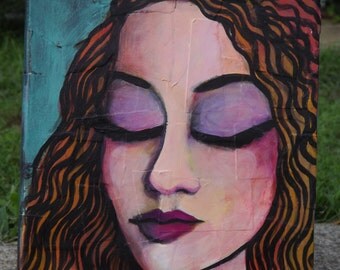Hey, how are you?
No, but really, how are you? Take a minute to meditate on it.
Close your eyes and feel your body on your seat or the ground. Notice any sensations.
Seriously, stop reading this and really experience how you are doing in this moment.
Notice any emotions that came up just then. Do you feel calm? anxious? sad? excited?
When someone texts you, Facebook messages you, or some other form of electronic communication, you have time to meditate on your response. You can ruminate on your ideas, spellcheck your messages, take your time formulating exactly what you mean and just want you want to get across. Not to mention, if you are feeling down, you can express that without the worry of your cracking voice being heard or teary, flushed face being seen.
"How are you?" has become a common greeting, casual conversation starter, and a quick check-in. But how often do we answer honestly? With whom? Through what medium?
Would you say "fine" on the phone to your mom, but then spill thrilling secrets to your best friend in person? Would you say "good" to your professor, but then complain about all of your stress and worries to your roommate later?
I started thinking about this because this has been an especially challenging week for me. I had some dramatic turn of events take place in my personal life that left me feeling incredibly vulnerable and emotionally on edge. I had to miss some class, and didn't even feel comfortable enough to eat in the dining hall. I didn't want to be around people. I didn't want to be asked "How are you?" casually, because I didn't want to lie, and I didn't think I could talk about my feelings at all without completely breaking down.
I isolated myself in my room and opened up to my roommate. We watched a funny movie together and it allowed me to take my mind off things.
When he couldn't be there, I texted a friend in another state. I was able to articulate to her my feelings and get support without leaving the comfort of my secluded cave.
I spent some time with close friends who gave me hugs and wise words.
I called my mom. I could vent to her and get reassurance from hundreds of miles away.
I turned to tumblr for inspiring stories and advice, and strangers uplifted me from across the globe.
After sometime I felt grounded and confident enough to go back into the embodied world.
Interestingly, the week before this, we talked about social support in my Interpersonal Media class. In class, we made a list of people in our lives who we exchange support with, and noted if we communicate with them face to face, or virtually. Almost everyone on my list fit in both categories; whether they were near or far, I had exchanged support with them via technology and IRL. Through this exercise, I started to realize that technology truly supplements rather than than replaces communication with those I am close with. My virtual identity is not separate from who I am, it is an extension of me. Because of my social networks online, I feel connected and know that there is information, advice, and inspiration out there constantly.
Some people argue that we are becoming more individualistic and isolated due to being glued to our smart phones and laptops. I'm not going to dismiss this idea. I am all for being present, and engaging with the senses. I don't think a virtual hug can compare to a physical one at all. I think that it is important to engage with the people near to us, and to not allow ourselves to be distracted and numbed by our ability to be constantly plugged in. But when we need a little escape, when we need some love from afar, when we can't pull it together and face the world-- I think it is pretty dang incredible that we don't have to be alone. Technology doesn't have to be isolating. This week, it greatly contributed to my healing. It's just a matter of doing so mindfully. I'm learning that the world is at my fingertips-- and it's incredibly empowering.


















